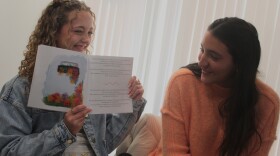New Hampshire’s first public memorial to the victims of the Holocaust officially opens in downtown Nashua this Sunday.
Unlike many memorials and museums, its funding didn’t come from a committee or a foundation.
Instead, the $150,000 was raised by a single man, former Nashua alderman Fred Teeboom, who was a Jewish child in hiding after the Nazis occupied Holland.
Nearly 70 years after he lived as a hidden child during World War II, Fred Teeboom is on a mission.
Under chilly, gray clouds, the former Nashua alderman leads a handful of middle school students down a railroad path at the New Hampshire Holocaust Memorial in Nashua.
He looks toward the six, eight-foot tall granite walls, separated by open sky. Each has an engraving:
What you see here are each of the names of the death camps, Auschwitz, Sobibor, Treblinka, Majdanek, Belzek and Chelmo. Over a million were killed in Auschwitz alone.
Despite the threat of a downpour, Teeboom continues to talk:
They brought them in off the trains and what did they do with the bodies? They burnt them. They dug huge pits. They initially used gasoline to get them started and then the bodies would burn by themselves.
The Holocaust memorial sits on an empty half-acre patch across from a shopping plaza, right next to an auto mechanic’s lot on the southern end of Nashua’s Main Street.
It’s an unusual spot for a commemoration – but one that carries meaning.
Sculptor John Weidman of Brookline designed the site:
When I first worked on the ash here, it was quite eerie to feel and to hear that crunchy sound that jack boots could have made in the early days.
Six granite walls stand almost like a theater in the round, on a surface of packed ash and epoxy.
In the center you have a brick column that represents the crematorium. And on top of that column of bricks is a very, very black polished cube. You end up seeing yourself in this black cube that represents a dark point in history. That’s a message relating to the idea that you can’t withdraw from things around you.
Again, Fred Teeboom:
To me, you can look at the shiny part of that image and see yourself reflected and say that except for the fortune of space and time, you could have been in that death camp.
Teeboom never experienced the death camps or witnessed a murder.
But he says his extended uncles, aunts and cousins, were not as fortunate.
There were a hundred Winniks on my mother’s side. A hundred Teebooms on my father’s side. They’re all gone. I started asking myself, why am I the only guy left? I feel there was a reason I was saved. It’s to build a memorial.
Teeboon inscribed his family’s name on one of the granite benches on the grassy area of the memorial.
But he says his earliest memories begin not with his birth parents, but from the devout Christian family that hid him from the Nazis:
When I met my playmate – their son. I must have been five years old. We were in a rural part of Holland.
Teeboom says he wasn’t aware his parents were taking him to someone’s home to be hidden. He doesn’t have a memory of being separated from his parents.
I just was with that family like they were like my mother and father. But a woman would visit occasionally and she was really my mother. But she couldn’t tell me she was my mother, especially since she was working underground at the time, trying to save other people.
Teeboom would eventually say goodbye to the only family he remembered, and reunite with his birth parents.
They moved to Amsterdam, then the Dutch West Indies, and later to Miami.
Teeboom came to Nashua in the 1970s.
Now he hopes the Holocaust memorial he founded in Nashua will leave an impression on visitors like 12 year-old Jacob Sacks of Hollis:
I just think it will help us keep in mind what happened and what can happen again.
A dedication ceremony is scheduled for Sunday, June first.














